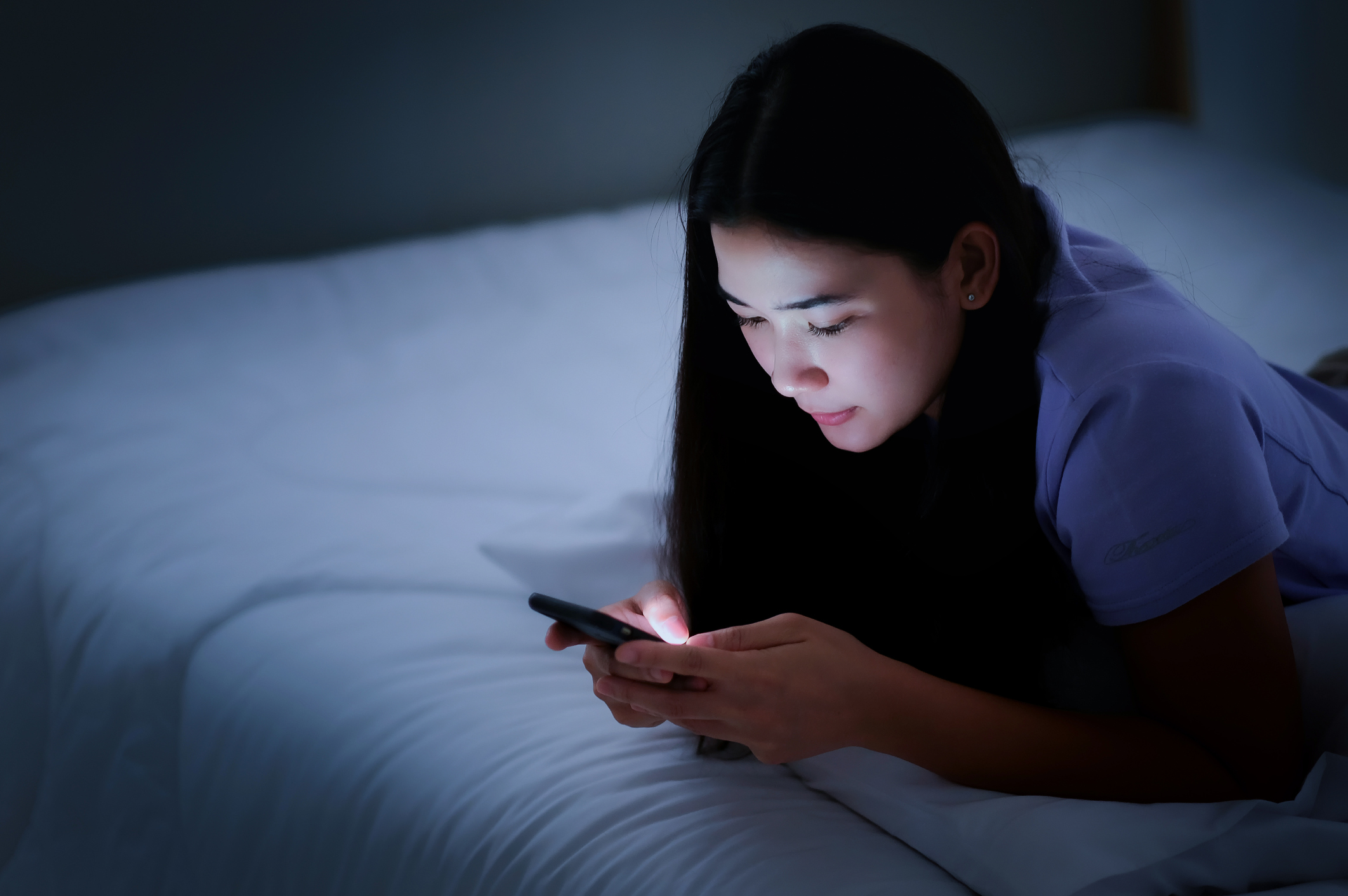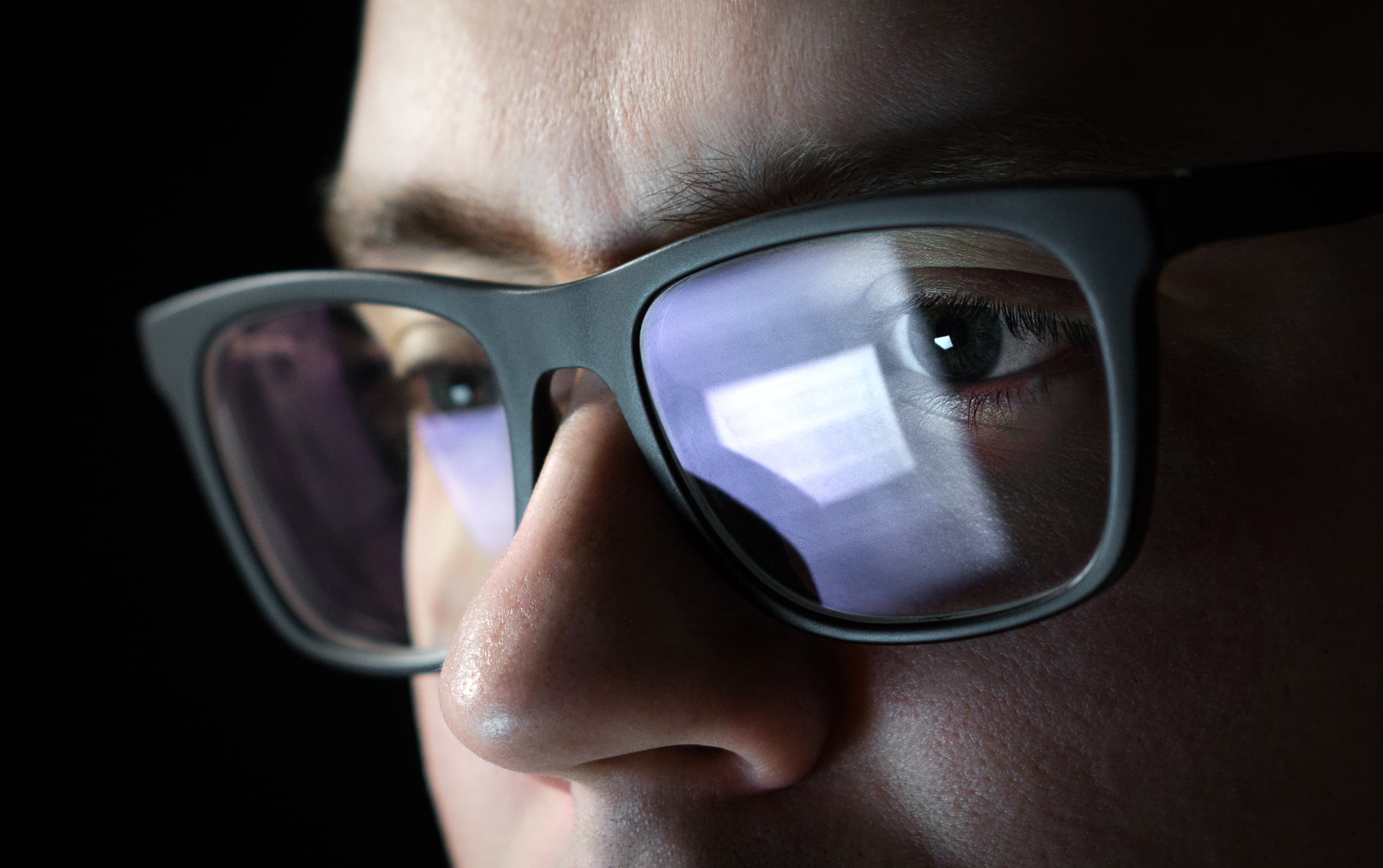Do you find yourself ending the day with red, itchy and burning eyes? Have you been getting headaches that you can’t chalk up to a few too many lockdown drinks? Perhaps you have a stiff neck too?
Then you could be experiencing the symptoms of digital eye strain.
The condition – although mostly temporary, with symptoms usually disappearing after a break from screen use, according to Bupa – is uncomfortable and can occur when you spend too long staring at digital devices.
And if you’re currently working on a computer all day then spending several more hours in front of Netflix in the evening, it’s no wonder your eyes are feeling more exhausted than usual.

Indeed, a study from the College of Optometrists revealed in July that one in five adults say their vision has become worse during the pandemic, with one in three blaming it on too much screen time.
But a new type of eyewear, called ‘blue light’ glasses, is promising to protect your eyes from daily screen damage – so could this be the gadget we need? We decided to find out…
Why is blue light thought to be harmful to us?
When you stare at a screen for hours at a time, whether it is a computer, TV, phone or tablet, you’re exposed to blue light.
Paul Morris, Specsavers (specsavers.co.uk) director of professional advancement says: “While it’s only a fraction of the amount emitted by the sun, because people spend such a large amount of time using devices, there is concern about potential long-term effects of blue light on eye health.”

Optometrist Martin Memory (opticians-salisbury.co.uk) adds that there are many studies which link blue light with a range of effects on your eyes.
“Blue light has a short wavelength which makes it easier to penetrate the eyes,” he explains. “The eye isn’t great at blocking these high-energy light wavelengths and it is said that the exposure to it may put you at risk of retina damage.”
However, Morris stresses that the level of blue light exposure from screens is less than that of natural daylight, so any damage caused would likely be very little, if at all.
How do blue light glasses work?
Just like sunscreen protects your skin from UV rays, blue light blocking glasses are designed to reduce the amount of blue light reaching the eye.
“The glasses are generally fitted with a lens that filters out the blue light when you look at a screen and prevents the damage reaching the retina,” explains Memory.
The suggested result is that you experience less eye strain. Plus blue light can mess with your circadian rhythm too, so some people claim that wearing them while watching TV at night can stop your sleep from being disrupted.
Unfortunately, there’s not a ton of evidence that blue light is what causes eye strain, or that you need to splash out on glasses to sort out the issue. “Studies on the real impact of blue light is still in very early days and with blue light glasses being a newer product they aren’t 100% proven,” says Memory.
“Many optometrists will say that the symptoms of digital eye strain is linked to how we use our digital devices and the amount of time we spend using then, and not the blue light being emitted.”

While both Morris and Memory say that the scientific evidence does not support the use of blue light glasses to improve visual performance, many people still continue to swear by wearing them, claiming that the protective eyewear has improved their visual comfort.
Do they actually help?
Like charcoal water and jade eggs, I was sceptical about whether the trendy glasses I was seeing all over Instagram were just another flash-in-the-pan wellness trend. But after months of noticing my eyes were feeling puffy and sore at the end of the day, I decided to see if wearing blue light glasses for two weeks could help.
My pair of choice were Ambr Eyewear’s Asteri blue-light blocking glasses (£51, ambreyewear.com). I was expecting some bulky goggle-shaped specs to arrive in the post – not unlike the kind you used to wear in school science lessons – but so many optical brands have recently jumped on the blue light trend and produced stylish frames that look just as great as regular glasses.

The unusual thing about blue light glasses is that there’s no noticeable difference when you first put them on. There’s no extra clarity to your vision and they don’t add a coloured ‘tint’ to the world around you.
After a few days of regular use at my desk, I noticed I was rubbing my eyes less often than usual and I wasn’t getting into bed feeling like they were parched or red raw. Wearing the glasses also made me more aware of my digital consumption, prompting me to take a lunch break that didn’t involve transferring my gaze to my phone screen.
Could it be a placebo effect? I’m unsure. As Memory said, with blue light glasses being a new product they are not 100% proven to work.
However, the glasses have been useful so far, so I’m going to keep intermittently using them. If, like me, you end the day feeling wiped out from staring at too many screens, you might want to try them out too.





